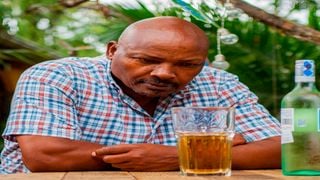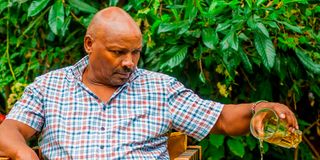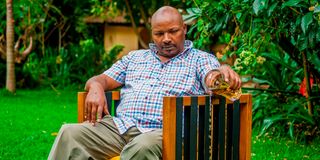Breaking News: Former Lugari MP Cyrus Jirongo dies in a road crash

Robert Ngugi in a pensive mood during the interview at his home in Loresho, Nairobi on October 26, 2023.
| Billy Ogada | Nation Media GroupLifestyle
Premium
Here’s why I spoke out against alcohol at my son’s funeral
What you need to know:
- This father says what he regrets most is that his son died before achieving the quite simple dream of having a family.
- Mr Ngugi and his family tried for years to save his son, but failed; the son who died at 40 never married and he left no child.
Robert Ngugi stood up to speak at his son’s funeral and did the unexpected. In African funerals, it is taboo for family and friends to talk negatively about the departed.
And most times, due to this cultural sensitivity, mourners rain praises and skirt around the cause of death.
But on August 9, 2023, Mr Ngugi eulogised his son differently.
Lifestyle visited the 59-year-old at his home in Nairobi’s Loresho. It is a quiet, serene neighbourhood, with wildflower lawns.
Evidently, Mr Ngugi is unsettled.

Robert Ngugi pours a glass of alcohol to the ground during the interview at his home in Loresho, Nairobi on October 26, 2023.
From his gestures, non-verbal cues and structured sentences, he finally articulates the emotional turmoil that his family has gone through trying to save his son, Matthew Kamau. About four months ago, Matthew died of alcoholism, at the age of 40.
“Let’s walk around and grab a cup of coffee at a nearby restaurant. We can have this interview outside my home,” Mr Ngugi says.
“You have the back story on how I lost my son and having this interview around here will give me raw memories of a son I loved and lost. I remember a time like this (8.30 pm) is when he would be checking in and later leave to his rented house not far away from here,” he says.
Mathew died on August 5, 2023 and was buried on August 9 in Gatundu North, Kiambu. He died after many years of struggling with alcoholism, failed rehabilitation and was discovered dead, his body already decomposing.
This father was the focus of public attention a few months ago after a video of him talking during the burial of his son went viral.
Read: It all started with a sip of Muratina: How drug, alcohol addiction robbed me 30 years of my life
He openly told mourners that he was opposed to the sugarcoated and cosmetic condolence messages that would imply that mourners understood what the family had gone through.
That he would rather confront the monster in the room by telling the mourners that his son died of alcoholism and that people start speaking out about it to tame irresponsible drinking that is killing hundreds of young men.
Since then, Mr Ngugi has been using any platform he gets to dissuade people from taking alcohol.
“I told the mourners and my family that I have to say the truth. I said ‘everyone who is standing here to speak is sugar-coating the truth. I know I am not alone in this. Many parents here have struggled with their daughters and sons because of alcohol. No one wants to talk about that (alcoholism) and that is why I am standing in front of you to tell the truth,” Mr Ngugi told the mourners.
He talks of the dreams he had for his son from when he was born, went to primary school and later joined Rumwe High School in Gatundu South, until he was transferred to Uganda’s Hillside International where he completed his studies in 2013.

Robert Ngugi pours a glass of alcohol to the ground during the interview at his home in Loresho, Nairobi on October 26, 2023.
“It is at Hillside High International School, (in Uganda) that he started having discipline issues and his appetite for alcohol became uncontrollable. When he came back home, we took him to a rehabilitation centre in Nairobi, but he would eventually find himself back to the alcohol,” Mr Ngugi says.
Since then, it became a repeated struggle with excessive drinking.
Kangemi, a low-income neighbourhood near Loresho, was his drinking den.
Mr Ngugi says Kangemi was more of a deathtrap because Matthew gulped alcohol at will, to the extent he could sneak into his father’s home in Loresho, steal valuable items and sell them for a song, just to buy alcohol.
Excessive drinking isolated him from his family.
“His last days were really devastating. He was found unresponsive at his house after three days. Dead,” Mr Ngugi says.
Mr Ngugi’s story resonates with many Kenyan parents whose children have died or are slowly dying of a disease that, sometimes, is rarely given a name.
Some do not know what to call it, because accepting that a son or a daughter, especially well-educated and with prospects of having a bright future, can be an alcoholic is hard.
Other Kenyans know the dangers of alcohol but reluctantly admit them because it spoils the enjoyment of a leisure activity loved by many.
Statistics from the latest Demographic Health Survey shows about 22 percent of Kenyan men consume three drinks a day, be it beer, wine, spirits, chang'aa, bussa, muratina or mnazi. Alcohol consumption per day increases with age, the survey shows, with 45 to 49-year-olds likely to drink more.
In Kenya, Tharaka Nithi leads with the highest number of men who drink daily, followed by Embu, Machakos and Murang'a.
Alcoholism weighs down on families, emotionally and financially, as they help their loved ones get sober. In 2016, Mr Ngugi says, Matthew asked for financial help to move to Qatar to work. The family sighed in relief that he had resumed a sense of normality.
Matthew also hoped that a better, happier life was waiting for him on the other side of sobriety.
He got a job as a driver but the job did not last. He continued drinking so much that he was sacked.
“After his return to Kenya, we took him to rehab but he never stopped taking alcohol. The drinking got worse, and at one point he was knocked down by a car in Uthiru while drunk and his skull cracked,” Mr Ngugi recalls.
He would later develop convulsions due to swelling of the brain.
Alcoholism takes its time. Mr Ngugi and his family tried for years to save his son who badly wanted to be a property owner and manager, following in the footsteps of his father, but it proved hard.
The father-of-two now says what he regrets most is that his son died before achieving the quite simple dream of having a family. He never married and he left no child.
In a society where parents are blamed if a child becomes an alcoholic, Mr Ngugi says he has no regret about how he raised his son.
“I gave him the best and made all necessary interventions to save him from alcohol. There is no best manual on how best to raise a child and I have no regrets, but I must admit I am bitter about having lost my son to alcohol,” he says.
His advice is very simple.
“If you have never taken alcohol, stay away from it. Avoid any company or friendship that can make or influence you into taking alcohol before it becomes an addiction and (gets you) enslaved into it,” he says.





